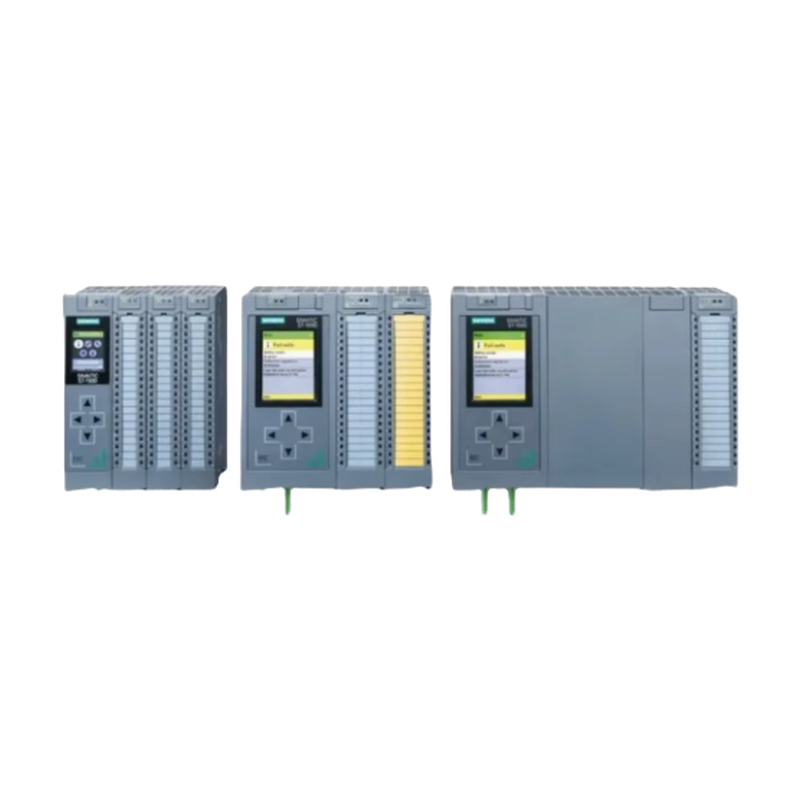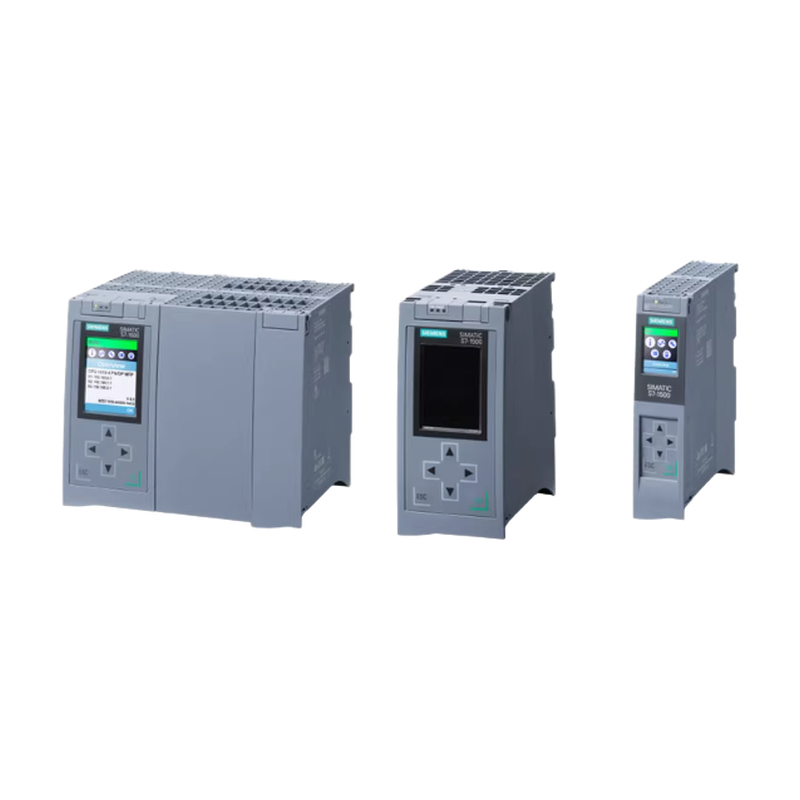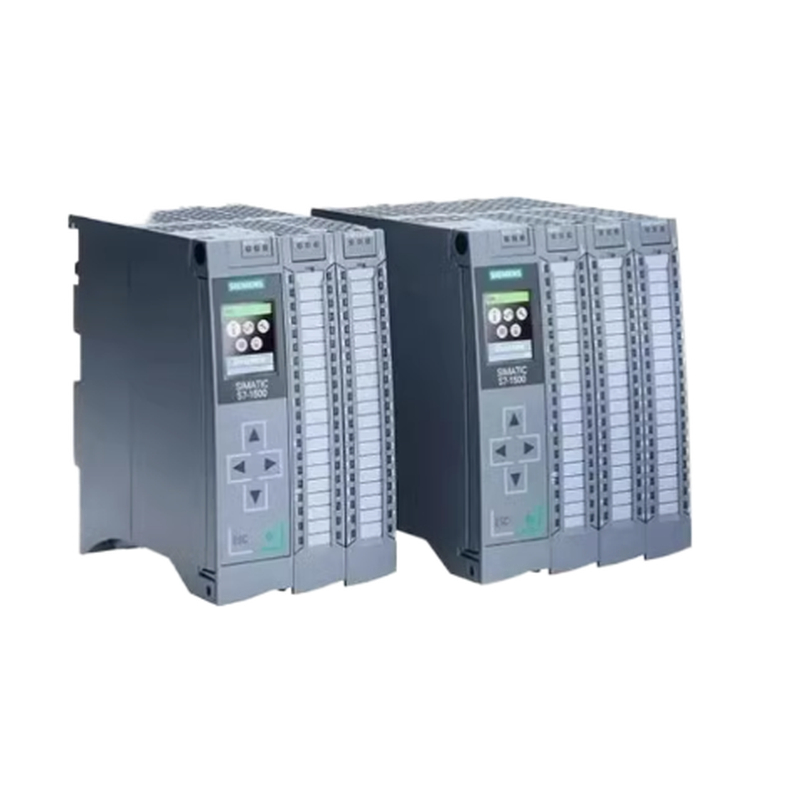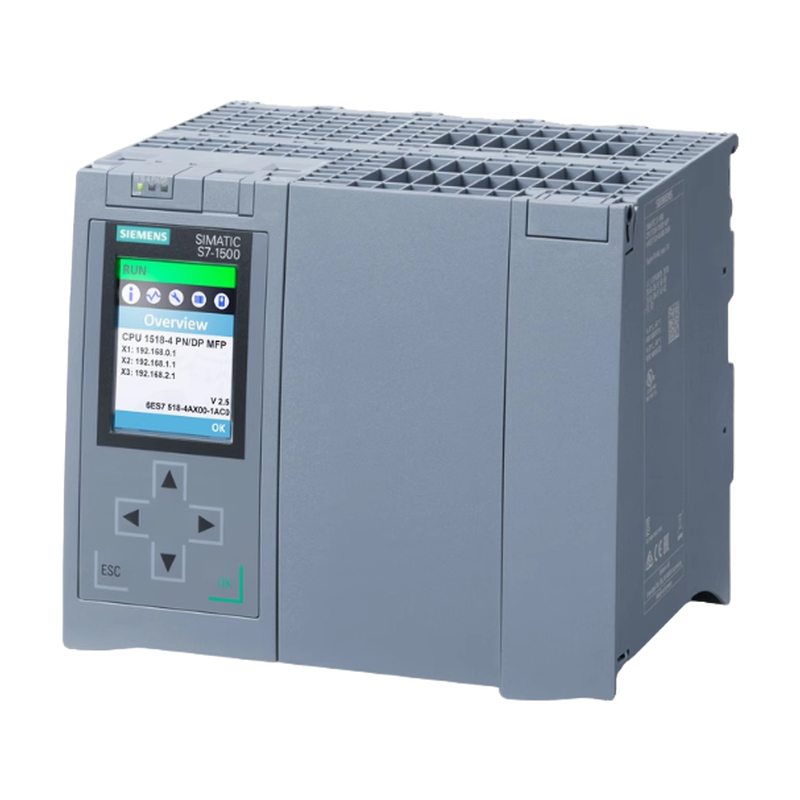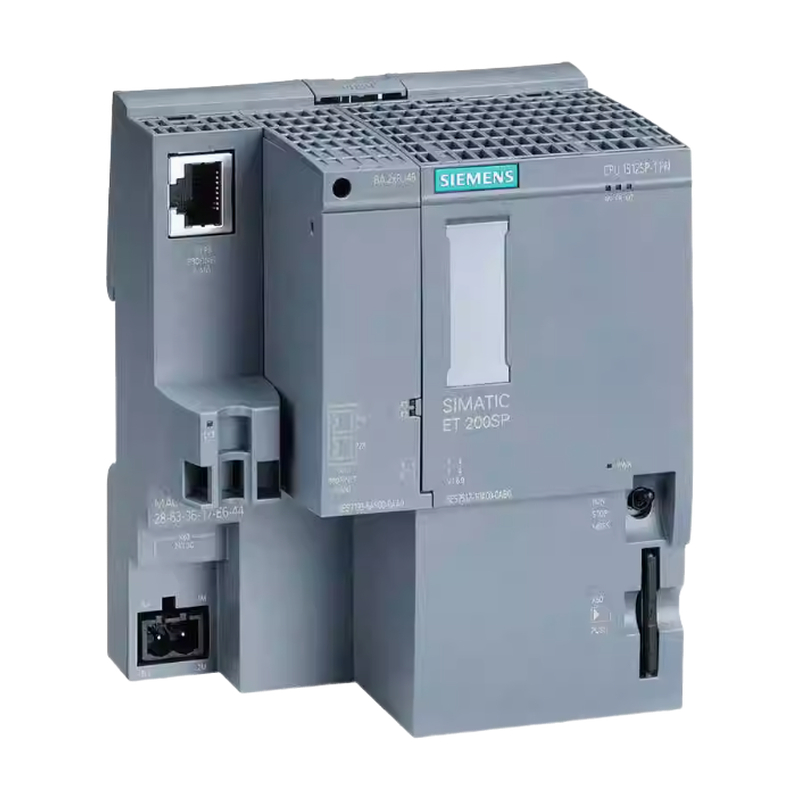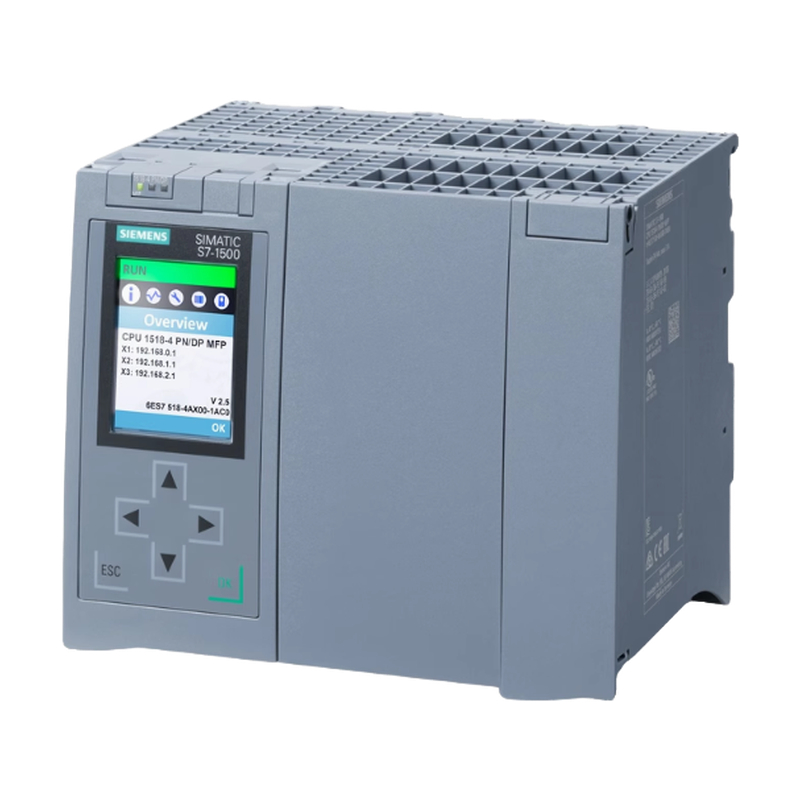| General information |
| Product type designation | CPU 1518-4 PN/DP |
| HW functional status | FS11 |
| Firmware version | V3.1 |
| ● FW update possible | Yes |
| Product function |
| ● I&M data | Yes; I&M0 to I&M3 |
| ● Isochronous mode | Yes; Distributed and central; with minimum OB 6x cycle of 125 µs (distributed) and 1 ms (central) |
| ● SysLog | Yes |
| Engineering with |
| ● STEP 7 TIA Portal configurable/integrated from version | V19 (FW V3.1); V13 (FW V1.5) or higher |
| Configuration control |
| via dataset | Yes |
| Display |
| Screen diagonal [cm] | 6.1 cm |
| Control elements |
| Number of keys | 6 |
| Mode selector switch | 1 |
| Supply voltage |
| Rated value (DC) | 24 V |
| permissible range, lower limit (DC) | 19.2 V |
| permissible range, upper limit (DC) | 28.8 V |
| Reverse polarity protection | Yes |
| Mains buffering |
| ● Mains/voltage failure stored energy time | 5 ms |
| ● Repeat rate, min. | 1/s |
| Input current |
| Current consumption (rated value) | 1.55 A |
| Current consumption, max. | 1.9 A |
| Inrush current, max. | 1.9 A; Rated value |
| I²t | 0.4 A²·s |
| Power |
| Infeed power to the backplane bus | 12 W |
| Power consumption from the backplane bus (balanced) | 30 W |
| Power loss |
| Power loss, typ. | 24 W |
| Memory |
| Number of slots for SIMATIC memory card | 1 |
| SIMATIC memory card required | Yes |
| Work memory |
| ● integrated (for program) | 6 Mbyte |
| ● integrated (for data) | 60 Mbyte |
| Load memory |
| ● Plug-in (SIMATIC Memory Card), max. | 32 Gbyte |
| Backup |
| ● maintenance-free | Yes |
| CPU processing times |
| for bit operations, typ. | 1 ns |
| for word operations, typ. | 2 ns |
| for fixed point arithmetic, typ. | 2 ns |
| for floating point arithmetic, typ. | 6 ns |
| CPU-blocks |
| Number of elements (total) | 20 000; Blocks (OB, FB, FC, DB) and UDTs |
| DB |
| ● Number range | 1 ... 60 999; subdivided into: number range that can be used by the user: 1 ... 59 999, and number range of DBs created via SFC 86: 60 000 ... 60 999 |
| ● Size, max. | 16 Mbyte; For DBs with absolute addressing, the max. size is 64 KB |
| FB |
| ● Number range | 0 ... 65 535 |
| ● Size, max. | 1 Mbyte |
| FC |
| ● Number range | 0 ... 65 535 |
| ● Size, max. | 1 Mbyte |
| OB |
| ● Size, max. | 1 Mbyte |
| ● Number of free cycle OBs | 100 |
| ● Number of time alarm OBs | 20 |
| ● Number of delay alarm OBs | 20 |
| ● Number of cyclic interrupt OBs | 20; with minimum OB 3x cycle of 100 µs |
| ● Number of process alarm OBs | 50 |
| ● Number of DPV1 alarm OBs | 3 |
| ● Number of isochronous mode OBs | 3 |
| ● Number of technology synchronous alarm OBs | 2 |
| ● Number of startup OBs | 100 |
| ● Number of asynchronous error OBs | 4 |
| ● Number of synchronous error OBs | 2 |
| ● Number of diagnostic alarm OBs | 1 |
| Nesting depth |
| ● per priority class | 24 |
| Counters, timers and their retentivity |
| S7 counter |
| ● Number | 2 048 |
| Retentivity |
| — adjustable | Yes |
| IEC counter |
| ● Number | Any (only limited by the main memory) |
| Retentivity |
| — adjustable | Yes |
| S7 times |
| ● Number | 2 048 |
| Retentivity |
| — adjustable | Yes |
| IEC timer |
| ● Number | Any (only limited by the main memory) |
| Retentivity |
| — adjustable | Yes |
| Data areas and their retentivity |
| Retentive data area (incl. timers, counters, flags), max. | 768 kbyte; In total; available retentive memory for bit memories, timers, counters, DBs, and technology data (axes): 700 KB |
| Extended retentive data area (incl. timers, counters, flags), max. | 20 Mbyte; When using PS 6 0W 24/48/60 V DC HF |
| Flag |
| ● Size, max. | 16 kbyte |
| ● Number of clock memories | 8; 8 clock memory bit, grouped into one clock memory byte |
| Data blocks |
| ● Retentivity adjustable | Yes |
| ● Retentivity preset | No |
| Local data |
| ● per priority class, max. | 64 kbyte; max. 16 KB per block |
| Address area |
| Number of IO modules | 16 384; max. number of modules / submodules |
| I/O address area |
| ● Inputs | 32 kbyte; All inputs are in the process image |
| ● Outputs | 32 kbyte; All outputs are in the process image |
| per integrated IO subsystem |
| — Inputs (volume) | 32 kbyte; max. 32 KB via X1; max. 8 KB via X2 or X4 |
| — Outputs (volume) | 32 kbyte; max. 32 KB via X1; max. 8 KB via X2 or X4 |
| per CM/CP |
| — Inputs (volume) | 8 kbyte |
| — Outputs (volume) | 8 kbyte |
| Subprocess images |
| ● Number of subprocess images, max. | 32 |
| Hardware configuration |
| Number of distributed IO systems | 64; A distributed I/O system is characterized not only by the integration of distributed I/O via PROFINET or PROFIBUS communication modules, but also by the connection of I/O via AS-i master modules or links (e.g. IE/PB-Link) |
| Number of DP masters |
| ● integrated | 1 |
| ● Via CM | 8; A maximum of 8 CMs/CPs (PROFIBUS, PROFINET, Ethernet) can be inserted in total |
| Number of IO Controllers |
| ● integrated | 2 |
| ● Via CM | 8; A maximum of 8 CMs/CPs (PROFIBUS, PROFINET, Ethernet) can be inserted in total |
| Rack |
| ● Modules per rack, max. | 32; CPU + 31 modules |
| ● Number of lines, max. | 1 |
| PtP CM |
| ● Number of PtP CMs | the number of connectable PtP CMs is only limited by the number of available slots |
| Time of day |
| Clock |
| ● Type | Hardware clock |
| ● Backup time | 6 wk; At 40 °C ambient temperature, typically |
| ● Deviation per day, max. | 10 s; Typ.: 2 s |
| Operating hours counter |
| ● Number | 16 |
| Clock synchronization |
| ● supported | Yes |
| ● to DP, master | Yes |
| ● on DP, device | Yes |
| ● in AS, master | Yes |
| ● in AS, device | Yes |
| ● on Ethernet via NTP | Yes |
| Interfaces |
| Number of PROFINET interfaces | 3 |
| Number of PROFIBUS interfaces | 1 |
| 1. Interface |
| Interface types |
| ● RJ 45 (Ethernet) | Yes; X1 |
| ● Number of ports | 2 |
| ● integrated switch | Yes |
| Protocols |
| ● IP protocol | Yes; IPv4 |
| ● PROFINET IO Controller | Yes |
| ● PROFINET IO Device | Yes |
| ● SIMATIC communication | Yes |
| ● Open IE communication | Yes; Optionally also encrypted |
| ● Web server | Yes |
| ● Media redundancy | Yes |
| PROFINET IO Controller |
| Services |
| — Isochronous mode | Yes |
| — Direct data exchange | Yes; Requirement: IRT and isochronous mode (MRPD optional) |
| — IRT | Yes |
| — PROFIenergy | Yes; per user program |
| — Prioritized startup | Yes; Max. 32 PROFINET devices |
| — Number of connectable IO Devices, max. | 512; In total, up to 1 000 distributed I/O devices can be connected via AS-i, PROFIBUS or PROFINET |
| — Of which IO devices with IRT, max. | 64 |
| — Number of connectable IO Devices for RT, max. | 512 |
| — of which in line, max. | 512 |
| — Number of IO Devices that can be simultaneously activated/deactivated, max. | 8; in total across all interfaces |
| — Number of IO Devices per tool, max. | 8 |
| — Updating times | The minimum value of the update time also depends on communication share set for PROFINET IO, on the number of IO devices, and on the quantity of configured user data |
| — PROFINET Security Class | 1 |
| Update time for IRT |
| — for send cycle of 125 µs | 125 µs |
| — for send cycle of 187.5 µs | 187.5 µs |
| — for send cycle of 250 µs | 250 µs to 4 ms |
| — for send cycle of 500 µs | 500 µs to 8 ms |
| — for send cycle of 1 ms | 1 ms to 16 ms |
| — for send cycle of 2 ms | 2 ms to 32 ms |
| — for send cycle of 4 ms | 4 ms to 64 ms |
| — With IRT and parameterization of "odd" send cycles | Update time = set "odd" send clock (any multiple of 125 µs: 375 µs, 625 µs ... 3 875 µs) |
| Update time for RT |
| — for send cycle of 250 µs | 250 µs to 128 ms |
| — for send cycle of 500 µs | 500 µs to 256 ms |
| — for send cycle of 1 ms | 1 ms to 512 ms |
| — for send cycle of 2 ms | 2 ms to 512 ms |
| — for send cycle of 4 ms | 4 ms to 512 ms |
| PROFINET IO Device |
| Services |
| — Isochronous mode | No |
| — IRT | Yes; Minimum send cycle of 250 µs |
| — PROFIenergy | Yes; per user program |
| — Shared device | Yes |
| — Number of IO Controllers with shared device, max. | 4 |
| — activation/deactivation of I-devices | Yes; per user program |
| — Asset management record | Yes; per user program |
| — PROFINET Security Class | SNMP Configuration and DCP Read Only |
| 2. Interface |
| Interface types |
| ● RJ 45 (Ethernet) | Yes; X2 |
| ● Number of ports | 1 |
| ● integrated switch | No |
| Protocols |
| ● IP protocol | Yes; IPv4 |
| ● PROFINET IO Controller | Yes |
| ● PROFINET IO Device | Yes |
| ● SIMATIC communication | Yes |
| ● Open IE communication | Yes; Optionally also encrypted |
| ● Web server | Yes |
| ● Media redundancy | No |
| PROFINET IO Controller |
| Services |
| — Isochronous mode | No |
| — Direct data exchange | No |
| — IRT | No |
| — PROFIenergy | Yes; per user program |
| — Prioritized startup | No |
| — Number of connectable IO Devices, max. | 128; In total, up to 1 000 distributed I/O devices can be connected via AS-i, PROFIBUS or PROFINET |
| — Number of connectable IO Devices for RT, max. | 128 |
| — of which in line, max. | 128 |
| — Number of IO Devices that can be simultaneously activated/deactivated, max. | 8; in total across all interfaces |
| — Number of IO Devices per tool, max. | 8 |
| — Updating times | The minimum value of the update time also depends on communication share set for PROFINET IO, on the number of IO devices, and on the quantity of configured user data |
| — PROFINET Security Class | 1 |
| Update time for RT |
| — for send cycle of 1 ms | 1 ms to 512 ms |
| PROFINET IO Device |
| Services |
| — Isochronous mode | No |
| — IRT | No |
| — PROFIenergy | Yes; per user program |
| — Prioritized startup | No |
| — Shared device | Yes |
| — Number of IO Controllers with shared device, max. | 4 |
| — activation/deactivation of I-devices | Yes; per user program |
| — Asset management record | Yes; per user program |
| — PROFINET Security Class | SNMP Configuration and DCP Read Only |
| 3. Interface |
| Interface types |
| ● RJ 45 (Ethernet) | Yes; X3 |
| ● Number of ports | 1 |
| ● integrated switch | No |
| Protocols |
| ● IP protocol | Yes; IPv4 |
| ● PROFINET IO Controller | No |
| ● PROFINET IO Device | No |
| ● SIMATIC communication | Yes |
| ● Open IE communication | Yes; Optionally also encrypted |
| ● Web server | Yes |
| 4. Interface |
| Interface types |
| ● RS 485 | Yes; X4 |
| ● Number of ports | 1 |
| Protocols |
| ● PROFIBUS DP master | Yes |
| ● PROFIBUS DP device | No |
| ● SIMATIC communication | Yes |
| PROFIBUS DP master |
| ● Number of connections, max. | 48; for the integrated PROFIBUS DP interface |
| ● max. number of DP devices | 125; In total, up to 1 000 distributed I/O devices can be connected via AS-i, PROFIBUS or PROFINET |
| Services |
| — Equidistance | Yes |
| — Isochronous mode | Yes |
| — activation/deactivation of DP devices | Yes |
| Interface types |
| RJ 45 (Ethernet) |
| ● 100 Mbps | Yes |
| ● 1000 Mbps | Yes; Only possible at the X3 interface of the CPU 1518 |
| ● Autonegotiation | Yes |
| ● Autocrossing | Yes |
| ● Industrial Ethernet status LED | Yes |
| RS 485 |
| ● Transmission rate, max. | 12 Mbit/s |
| Protocols |
| PROFIsafe | No |
| Number of connections |
| ● Number of connections, max. | 384; via integrated interfaces of the CPU and connected CPs / CMs |
| ● Number of connections reserved for ES/HMI/web | 10 |
| ● Number of connections via integrated interfaces | 320 |
| ● Number of S7 routing paths | 64; in total, only 16 S7-Routing connections are supported via PROFIBUS |
| Redundancy mode |
| ● H-Sync forwarding | Yes |
| Media redundancy |
| — Media redundancy | only via 1st interface (X1) |
| — MRP | Yes; MRP Automanager according to IEC 62439-2 Edition 2.0, MRP Manager; MRP Client |
| — MRP interconnection, supported | Yes; as MRP ring node according to IEC 62439-2 Edition 3.0 |
| — MRPD | Yes; Requirement: IRT |
| — Switchover time on line break, typ. | 200 ms; For MRP, bumpless for MRPD |
| — Number of stations in the ring, max. | 50 |
| SIMATIC communication |
| ● PG/OP communication | Yes; encryption with TLS V1.3 pre-selected |
| ● S7 routing | Yes |
| ● Data record routing | Yes |
| ● S7 communication, as server | Yes |
| ● S7 communication, as client | Yes |
| ● User data per job, max. | See online help (S7 communication, user data size) |
| Open IE communication |
| ● TCP/IP | Yes |
| — Data length, max. | 64 kbyte |
| — several passive connections per port, supported | Yes |
| ● ISO-on-TCP (RFC1006) | Yes |
| — Data length, max. | 64 kbyte |
| ● UDP | Yes |
| — Data length, max. | 2 kbyte; 1 472 bytes for UDP broadcast |
| — UDP multicast | Yes; 128 multicast circuits (of which max. 5 via X1) |
| ● DHCP | Yes |
| ● DNS | Yes |
| ● SNMP | Yes |
| ● DCP | Yes |
| ● LLDP | Yes |
| ● Encryption | Yes; Optional |
| Web server |
| ● HTTP | Yes; Standard and user pages |
| ● HTTPS | Yes; Standard and user pages |
| ● web API |
|
| — Number of sessions, max. | 200 |
| — number of simultaneous HTTP calls, max. | 4 |
| — HTTP request body, max. | 131 072 byte |
| OPC UA |
| ● Runtime license required | Yes; "Large" license required |
| ● OPC UA Client | Yes; Data Access (registered Read/Write), Method Call |
| — Application authentication | Yes |
| — Security policies | Available security policies: None, Basic128Rsa15, Basic256Rsa15, Basic256Sha256 |
| — User authentication | "anonymous" or by user name & password |
| — Number of connections, max. | 40 |
| — Number of nodes of the client interfaces, recommended max. | 5 000 |
| — Number of elements for one call of OPC_UA_NodeGetHandleList/OPC_UA_ReadList/OPC_UA_WriteList, max. | 300 |
| — Number of elements for one call of OPC_UA_NameSpaceGetIndexList, max. | 20 |
| — Number of elements for one call of OPC_UA_MethodGetHandleList, max. | 100 |
| — Number of simultaneous calls of the client instructions for session management, per connection, max. | 1 |
| — Number of simultaneous calls of the client instructions for data access, per connection, max. | 5 |
| — Number of registerable nodes, max. | 5 000 |
| — Number of registerable method calls of OPC_UA_MethodCall, max. | 100 |
| — Number of inputs/outputs when calling OPC_UA_MethodCall, max. | 20 |
| ● OPC UA Server | Yes; Data Access (Read, Write, Subscribe), Method Call, Alarms & Condition (A&C), Custom Address Space |
| — Application authentication | Yes |
| — Security policies | available security policies: None, Basic128Rsa15, Basic256Rsa15, Basic256Sha256, Aes128Sha256RsaOaep, Aes256Sha256RsaPss |
| — User authentication | "anonymous" or by user name & password |
| — GDS support (certificate management) | Yes |
| — Number of sessions, max. | 64 |
| — Number of accessible variables, max. | 200 000 |
| — Number of registerable nodes, max. | 50 000 |
| — Number of subscriptions per session, max. | 50 |
| — Sampling interval, min. | 10 ms |
| — Publishing interval, min. | 10 ms |
| — Number of server methods, max. | 100 |
| — Number of inputs/outputs per server method, max. | 20 |
| — Number of monitored items, recommended max. | 24 000; for 1 s sampling interval and 1 s send interval |
| — Number of server interfaces, max. | 10 of each "Server interfaces" / "Companion specification" type and 20 of the type "Reference namespace" |
| — Number of nodes for user-defined server interfaces, max. | 50 000 |
| ● Alarms and Conditions | Yes |
| — Number of program alarms | 400 |
| — Number of alarms for system diagnostics | 200 |
| Further protocols |
| ● MODBUS | Yes; MODBUS TCP |
| Isochronous mode |
| Equidistance | Yes |
| S7 message functions |
| Number of login stations for message functions, max. | 64 |
| number of subscriptions, max. | 750 |
| number of tags/attributes for subscriptions, max. | 50 000 |
| Program alarms | Yes |
| Number of configurable program messages, max. | 10 000; Program messages are generated by the "Program_Alarm" block, ProDiag or GRAPH |
| Number of loadable program messages in RUN, max. | 10 000 |
| Number of simultaneously active program alarms |
|
| ● Number of program alarms | 4 000 |
| ● Number of alarms for system diagnostics | 1 000 |
| ● Number of alarms for motion technology objects | 480 |
| Test commissioning functions |
| Joint commission (Team Engineering) | Yes; Parallel online access possible for up to 10 engineering systems |
| Status block | Yes; Up to 16 simultaneously (in total across all ES clients) |
| Single step | No |
| Number of breakpoints | 20 |
| Profiling | No |
| Status/control |
| ● Status/control variable | Yes |
| ● Variables | Inputs/outputs, memory bits, DBs, distributed I/Os, timers, counters |
| ● Number of variables, max. |
|
| — of which status variables, max. | 200; per job |
| — of which control variables, max. | 200; per job |
| Forcing |
| ● Forcing | Yes |
| ● Forcing, variables | Peripheral inputs/outputs |
| ● Number of variables, max. | 200 |
| Diagnostic buffer |
| ● present | Yes |
| ● Number of entries, max. | 3 200 |
| — of which powerfail-proof | 1 000 |
| Traces |
| ● Number of configurable Traces | 8 |
| ● Memory size per trace, max. | 512 kbyte |
| Interrupts/diagnostics/status information |
| Diagnostics indication LED |
| ● RUN/STOP LED | Yes |
| ● ERROR LED | Yes |
| ● MAINT LED | Yes |
| ● Connection display LINK TX/RX | Yes |
| Supported technology objects |
| Motion Control | Yes; Note: The number of technology objects affects the cycle time of the PLC program; selection guide via the TIA Selection Tool |
| ● Number of available Motion Control resources for technology objects | 15 360 |
| ● Required Motion Control resources |
|
| — per speed-controlled axis | 40 |
| — per positioning axis | 80 |
| — per synchronous axis | 160 |
| — per external encoder | 80 |
| — per output cam | 20 |
| — per cam track | 160 |
| — per probe | 40 |
| ● Positioning axis |
|
| — Number of positioning axes at motion control cycle of 4 ms (typical value) | 140 |
| — Number of positioning axes at motion control cycle of 8 ms (typical value) | 192 |
| Controller |
|
| ● PID_Compact | Yes; Universal PID controller with integrated optimization |
| ● PID_3Step | Yes; PID controller with integrated optimization for valves |
| ● PID-Temp | Yes; PID controller with integrated optimization for temperature |
| Counting and measuring |
|
| ● High-speed counter | Yes |
| Standards, approvals, certificates |
| Ecological footprint |
| ● environmental product declaration | Yes |
| Global warming potential |
| — global warming potential, (total) [CO2 eq] | 570 kg |
| — global warming potential, (during production) [CO2 eq] | 96.9 kg |
| — global warming potential, (during operation) [CO2 eq] | 483 kg |
| — global warming potential, (after end of life cycle) [CO2 eq] | -9.97 kg |
| Ambient conditions |
| Ambient temperature during operation |
| ● horizontal installation, min. | 0 °C |
| ● horizontal installation, max. | 60 °C; Display: 50 °C, at an operating temperature of typically 50 °C, the display is switched off |
| ● vertical installation, min. | 0 °C |
| ● vertical installation, max. | 40 °C; Display: 40 °C, at an operating temperature of typically 40 °C, the display is switched off |
| Ambient temperature during storage/transportation |
| ● min. | -40 °C |
| ● max. | 70 °C |
| Altitude during operation relating to sea level |
| ● Installation altitude above sea level, max. | 5 000 m; Restrictions for installation altitudes > 2 000 m, see manual |
| configuration / header |
| configuration / programming / header |
| Programming language |
| — LAD | Yes |
| — FBD | Yes |
| — STL | Yes |
| — SCL | Yes |
| — CFC | Yes |
| — GRAPH | Yes |
| Know-how protection |
| ● User program protection/password protection | Yes |
| ● Copy protection | Yes |
| ● Block protection | Yes |
| Access protection |
| ● protection of confidential configuration data | Yes |
| ● Password for display | Yes |
| ● Protection level: Write protection | Yes |
| ● Protection level: Read/write protection | Yes |
| ● Protection level: Write protection for Failsafe | No |
| ● Protection level: Complete protection | Yes |
| ● User administration | Yes; device-wide |
| programming / cycle time monitoring / header |
| ● lower limit | adjustable minimum cycle time |
| ● upper limit | adjustable maximum cycle time |
| Dimensions |
| Width | 175 mm |
| Height | 147 mm |
| Depth | 129 mm |
| Weights |
| Weight, approx. | 2 079 g |
